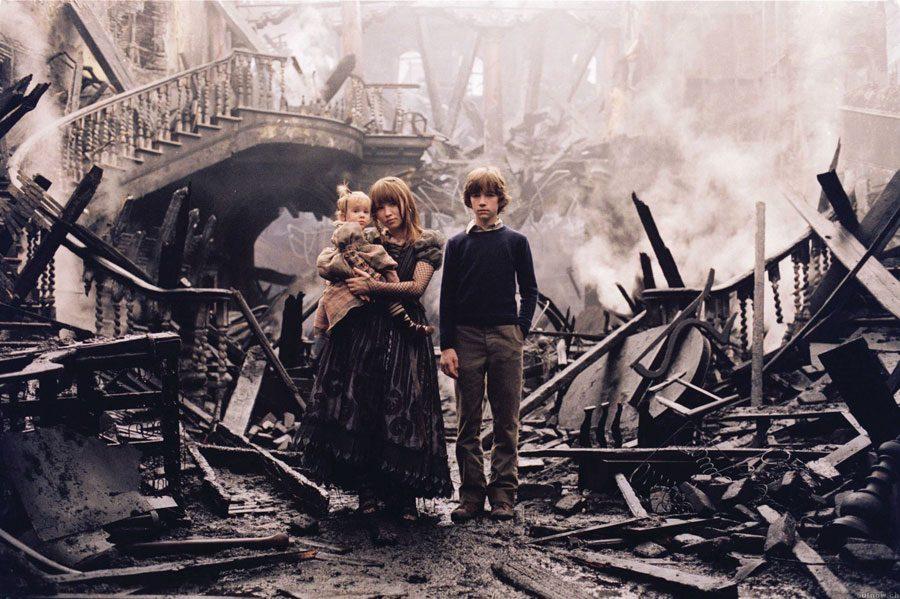Film adaptation brings doom, gloom and dark humor
Cheery, high pitched music begins as you soar through a canopy of clay trees to settle into a bright and pastel-colored forest of claymation. A jingly tune singing of the joys of spring begins and a large-headed elf-child bursts from a wooden door in the trunk of tree and starts frolicking manically among woodland creatures. This lasts all of five seconds before an ominous darkness abruptly descends and a melancholy man’s voice begins to tell you this is unfortunately not the movie you will be watching. (Thank God.)
This voice belongs to Lemony Snicket (pen name of author Daniel Handler, who created himself as a main character for his own book series), actively involved in the history and storyline of the world as a chronicler and narrator of the main characters’ plights. As his solemn duty, Mr. Snicket warns audiences and readers at any chance to look away and not continue to learn of these horrid events. Welcome to the world of “A Series of Unfortunate Events.”
“A Series of Unfortunate Events” is based on Lemony Snicket’s “children’s” book series of the same name. Comprising of 13 separate volumes, the story follows the dark and ludicrous journey of the three Baudelaire orphans as they search for the answers about their parents’ mysterious death and continually avoid the clutches of their evil uncle Count Olaf, who follows them relentlessly.
Jim Carrey is Count Olaf, a sinister and unibrowed melodramatic stage actor who is as hungry for the Baudelaire’s fortune as he is unhygienic. When the Baudelaire children are placed in his care after their parents are killed in a terrible fire, he very quickly establishes his greedy intentions without any other adult seeming to pay heed to his inability to parent responsibly.
The three Baudelaire orphans are accurately portrayed as gloomy and brilliant children, still mourning the sudden death of their parents and on edge the entire film trying to convince unobservant adults about Count Olaf’s return. Violet, the inventor, is played by Emily Browning. Klaus, the reader, is played by Liam Aiken. And Sunny, merely a baby who loves biting and speaking in her own garbled baby speak, is played by twin actresses Kara and Shelby Hoffman.
“A Series of Unfortunate Events” is a dark comedy that gleefully portrays horrifying and macabre scenarios with a calmly disappointed yet pragmatic air. It seems to be set in an unspecified time in America, somewhat a mix of the late Victorian era and the early 1960s. The film is a twisting mystery of secret messages, metaphors and foreshadowing. An eye tattoo revealed on Count Olaf’s left ankle quickly reveals there are other mysterious factors at work here involving a secret society.
This 2004 movie adaption of the book series was directed by Brad Silberling and written by Robert Gordon. It follows the storyline of the first three volumes of the series only, “The Bad Beginning,” “The Reptile Room” and “The Wide Window,” leaving audiences somewhat hanging by the end of the film.
I grew up with these books since I was seven years old and, along with the Harry Potter series, and films were one of the most influential components of my childhood in shaping my sense of humor and taste in film and books. Dark and deadpan humor, clever observations about the often unspoken absurdities of the world around us, the importance of intelligence in the fight against evil, and the disappointing nature and stupidity of adults are some of the main themes of this film.
Silberling does an admirable job of translating the atmosphere of the books, yet did not stay as true to the source material as many fans hoped. A gothic and gloomy atmosphere hangs over the entire film, yet Silberling disappointingly softened many of the more disturbing and dark points in the books, portraying them in a more ironic and humorous light instead of outright disturbing, including the portrayal of Count Olaf.
Carrey does a great job of portraying the sinister and dramatic side of Count Olaf, but overshadows the darkness of the character by portraying him as extremely manic and comedic, which is not seen often in the books. Other adults in the film include Timothy Spall as the unwitting and ever-coughing Mr. Poe, Billy Connolly as the Baudelaire’s kind herpetologist uncle and Meryl Streep as their anxiety-ridden aunt.
Aiding in giving the film an almost otherworldly feel, the film was entirely shot at sets at the Universal Film Studios. As the Baudelaire orphans are whisked somewhat disjointedly from one adult guardian to the next, the film starts to feel a bit episodic, with the atmosphere shifting from one set location to the next.
However, these sets are deliciously gothic in style and are extremely rich and detailed, effectively reflecting minute details about the characters that inhabit them, which makes up for the strange pacing of the film. The score is another strong component of the film. Composed by Thomas Newman, the score is extremely versatile, bringing quirky and curious pieces to the lighter scenes throughout while still maintaining a depressing and imposing feeling of dread throughout the film.
Overall, “A Series of Unfortunate Events” is a bizarre and subversive delight to behold. Many fans of the book will be disappointed in the choices made for this adaption, but the film stays mostly true to its source material, despite the fact that it has tonal issues throughout.
If you are in the mood for a clever and sinister film that makes you question your faith in the good of humanity yet strengthens your belief in the power of intelligence and ingenuity against the forces of evil, pay no heed to Mr. Snicket’s advice to look away. Just remember, you’ve been warned.









